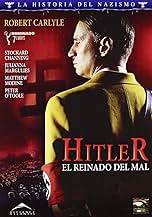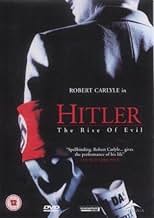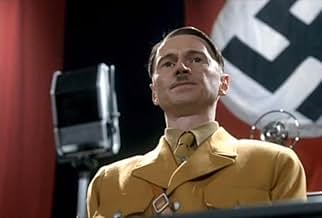Aus einem einzigartiger Blickwinkel, wird das Leben Adolf Hitlers als Kind und seinen Aufstieg in den Reihen der Nationalsozialistischen Deutschen Arbeiterpartei (NSDAP) vor dem Zweiten Welt... Alles lesenAus einem einzigartiger Blickwinkel, wird das Leben Adolf Hitlers als Kind und seinen Aufstieg in den Reihen der Nationalsozialistischen Deutschen Arbeiterpartei (NSDAP) vor dem Zweiten Weltkrieg porträtiert.Aus einem einzigartiger Blickwinkel, wird das Leben Adolf Hitlers als Kind und seinen Aufstieg in den Reihen der Nationalsozialistischen Deutschen Arbeiterpartei (NSDAP) vor dem Zweiten Weltkrieg porträtiert.
- 2 Primetime Emmys gewonnen
- 5 Gewinne & 18 Nominierungen insgesamt
Empfohlene Bewertungen
Heavens, I never felt so completely confused about a movie after pushing the 'stop' button on my DVD-player's remote. I simply couldn't decide whether I liked it or not.
First of all, the performances set by Carlyle and companions are quite good. A little over-acted every now and then, especially Carlyle who obviously tries his up-most to copy the "Führer" and his body-language. He acts as if he is in a theatre, and seems to forget the fact that camera's register way more details/facial expressions. Compare a real recording of a Hitler-speech with one of Carlyle's speech-scene's and you'll see what I mean.
Then comes the Historical accuracy. Not quite bad, but I kept noticing small things which obviously were incorrect. Uniforms, weapons, bread-prices, skinny-Röhm, fat Hess... not really impressive job I might say.
but one of the most compelling things about the whole film (or series, I 've seen it as a film) is the fact that it is very obvious the director desperately wants to show the world Hitler was a sick-minded, over-emotional and completely mentally unstable person. Well, I can assure you this: He absolutely had his periods of mental disturbances and ignoring the truth, especially toward the war's end. But this... I have read many, many eye-witness reports from people who lived in his presence, like Albert Speer. They all agreed on some things, namely the facts Adolf Hitler was very often a think full, correct, funny, honorable man. Hitler was the mastermind behind the Nazi's criminal and appalling Holocaust. Hitler was a criminal. A kind of person that can never be allowed to rise to power again. This is obviously the reason why the director choose to show him the way he did. However, Hitler was dangerous not because he was a monster, he was dangerous because he was so intelligent, so well-spoken. Because he was worshipped by so many, because he knew what to say to 'his' people. That was the real danger, and that's exactly what we must teach. Think of it this way: The most successful murderers and big criminals are usually the smart, well-spoken and socially established men. You wouldn't know he is a monster until you see what he has done.
I wish the director/writer added a bit more humanity to his character. But obviously they chose to show the audience Hitler changed from a normal person into a monster. Talking about stereotypes and negligence of the truth.
Overall I still found it an enjoyable movie which does achieve one of it's main goals: portraying us, the crowd, as willing sheep, especially in times of need. Ye be warned.
Rating: 6.5/10
** Note: One very imposing scene: Hitler speaks out loud his ideas in the court-yard, with Hess recording it. After awhile you get to see a different day every now and then, and every time more and more inmates cheer him from behind their bars overlooking the yard.
The script is ropey. Especially in the early stages the characters lecture each other with historical information they would all already know, for the benefit of viewers - a classic mistake. Later we have Hindenburg talking about defending democracy. Hindenburg was not a democrat. He believed it was his duty to serve the state and to uphold its constitution.
Many have noted that Robert Carlyle's ranting Hitler would never have come to power. He'd have been certified. Why the makers of this went for this one-dimensional treatment is a mystery.
The film suggests that the Nazis could provoke an election just by walking out of the Reichstag chamber - an over-simplification to say the least.
The scenes with the newspaper man do not ring true at all, and are an embarrassment.
It all gets very rushed once Hitler becomes chancellor. The key election after the Reichstag fire is omitted. There is no mention of the Communists and Social Democrats who were missing from the session which passed the enabling law in an atmosphere of fear. The Night of the Long Knives appears to come immediately after this, although it took place 15 months later. It's a hopeless jumble.
Unfortunately, and presumably in order to avoid any charge of creating sympathy for Hitler, the filmmakers portray him as an always angry and ranting sociopath. Yet, according to most historians, Hitler, despite being an undeniable political monster directly responsible for the death of millions of people, could be also charming and charismatic. Hitler, as portrayed by the Scottish actor Robert Carlyle, is so off putting, you wonder why anyone would decide to follow him. (In this movie, even as a child, Hitler seems to be channeling the bad seed). Some other Hitler movies have been more honest in this respect: the German film Downfall is the first movie that comes to mind, but even the little known Hollywood film from 1944 "The Hitler gang" shows Hitler as friendly and charming with his associates.
I found it also somewhat disappointing that most of the actors don't resemble their characters much: the actor playing Goebbels is the one that resemble it most; the legendary Peter O'Toole is fine in his brief turn as Von Hindenburg; Carlyle don't look a lot like Hitler; the actors playing Goering and Rohm none at all. Also unfortunate is that some major associates of Hitler like Himmler do not appear at all here, while the relatively unknown Ernst Hanfstaengl (played by Liev Schreiber) is one of the major characters here.
These objections aside, I must finally say that this miniseries is undeniably entertaining and never boring, despite being three hours long.
Wusstest du schon
- WissenswertesGeli's lines when she is smoking with the driver, just after being told her uncle is "a good man", ("he's a monster... you can't imagine what he asks of me") are Geli Raubal's actual words, taken directly from her journal. Allegedly, Adolf Hitler drew a series of pornographic sketches of her, titled "Miss Raubal in close-ups and angles to which any professional model would decline posing for."
- PatzerAdolf Hitler did not beat his dog out of frustration at the trenches, the dog was actually a beloved pet who Hitler called a 'Proper circus dog'. Hitler was also a huge supporter of animal rights in Nazi Germany and even tried to make the whole of Germany vegetarian.
- Zitate
President Paul von Hindenburg: If I appoint you Chancellor, how will I answer to God?
Adolf Hitler: How will you answer to Germany if you don't?
- Alternative VersionenNetwork Seven, in Australia originally aired this as a two part mini series.
- VerbindungenFeatured in The 55th Annual Primetime Emmy Awards (2003)
Top-Auswahl
- How many seasons does Hitler: The Rise of Evil have?Powered by Alexa
Details
- Erscheinungsdatum
- Herkunftsländer
- Offizieller Standort
- Sprache
- Auch bekannt als
- Hitler - Der Aufstieg des Bösen
- Drehorte
- Produktionsfirma
- Weitere beteiligte Unternehmen bei IMDbPro anzeigen

































